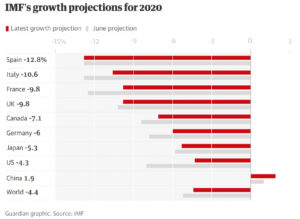World economic outlook says 2020 impact is less than thought but there will be deep scars

The International Monetary Fund has scaled back its estimate of the hit to the global economy from Covid-19 this year but warned that the final bill for the pandemic would total $28tn (£21.5tn) in lost output.Gita Gopinath, the IMF’s economic counsellor, described coronavirus as the worst crisis since the Great Depression, and said the pandemic would leave deep and enduring scars caused by job losses, weaker investment and children being deprived of education.
In its flagship world economic outlook, the IMF said a stronger than expected performance in the second and third quarters meant it believed global output would fall by 4.4% in 2020 compared with the 5.2% drop forecast during the summer.
But the Washington-based organisation said rising infection rates in some emerging market economies had forced it to pare back its estimate of the rebound in 2021 from 5.4% to 5.2%. The gap between rich and poor countries was growing, it added.
Gopinath said: “The cumulative loss in output relative to the pre-pandemic projected path is projected to grow from $11tn over 2020-21 to $28tn over 2020-25,” Gopinath said in a blog. “This represents a severe setback to the improvement in average living standards across all country groups.”

The IMF said swift action by central banks had softened the impact of the damage to economic activity caused by lockdowns, and warned against the premature removal of support measures.
Canada alone of the G7 countries is now expected to grow more rapidly in 2021 than was forecast in June. The IMF said it had cut its estimate of UK growth by 0.4 points to 5.9% next year.
Gopinath said that while the world was adapting and coming back from the depths of its collapse in the early months of 2020, the crisis was far from over.
“Employment remains well below pre-pandemic levels and the labour market has become more polarised with low-income workers, youth, and women being harder hit,” she said. “The poor are getting poorer with close to 90 million people expected to fall into extreme deprivation this year. The ascent out of this calamity is likely to be long, uneven and highly uncertain.”

Leave A Comment